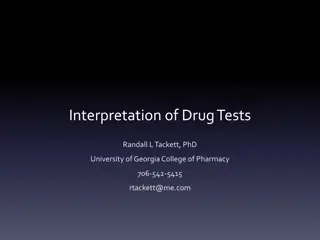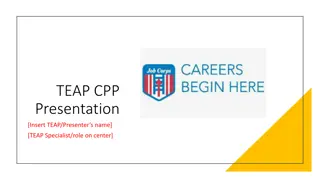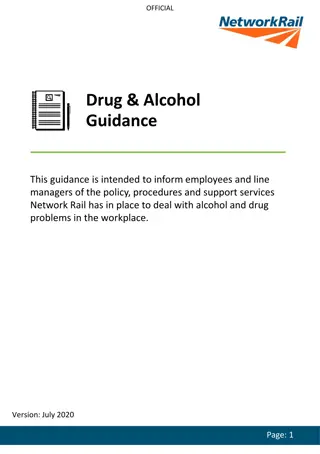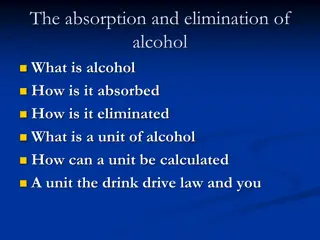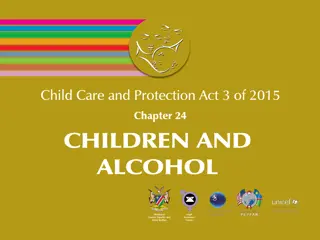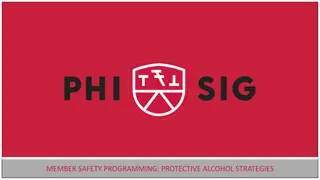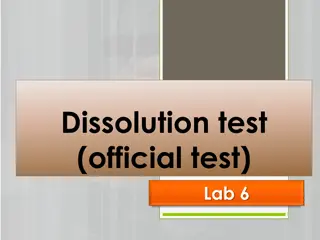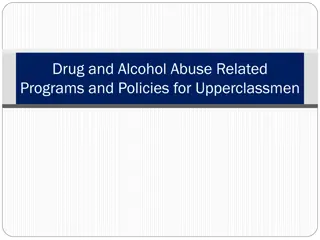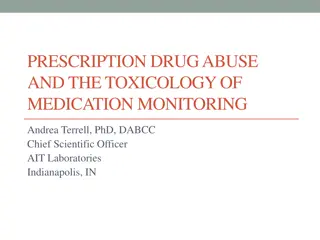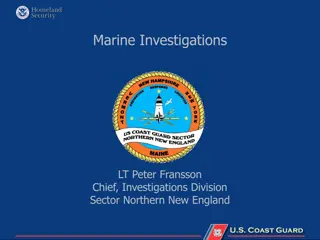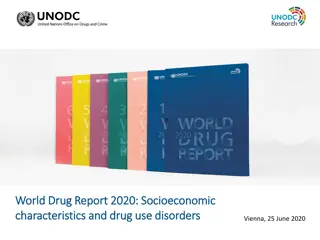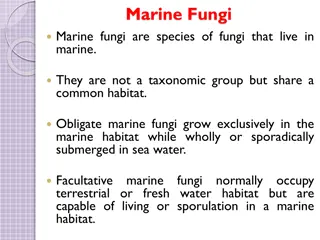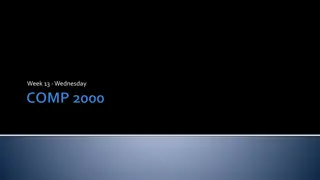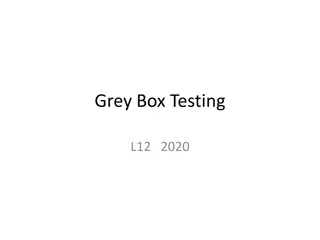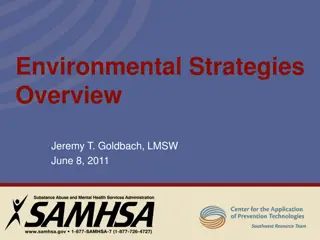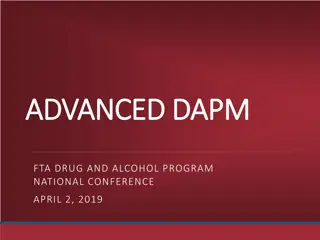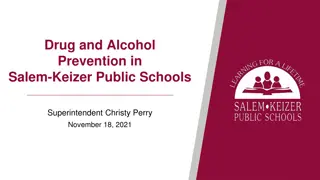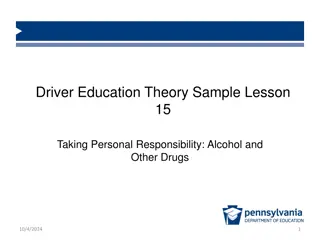Comprehensive Guide to Drug and Alcohol Testing Regulations for Marine Employers
This comprehensive guide provides detailed information on the regulatory requirements for drug and alcohol testing in the marine industry. It covers relevant sections of the Code of Federal Regulations (CFR), definitions of key terms, chain of custody procedures, and important roles such as Drug and Alcohol Program Inspectors (DAPI) and Designated Employer Representatives (DER). Understanding and complying with these regulations is crucial for marine employers to maintain safety and compliance standards.
Download Presentation

Please find below an Image/Link to download the presentation.
The content on the website is provided AS IS for your information and personal use only. It may not be sold, licensed, or shared on other websites without obtaining consent from the author. Download presentation by click this link. If you encounter any issues during the download, it is possible that the publisher has removed the file from their server.
E N D
Presentation Transcript
Drug and Alcohol Testing MDK 200
Applicable Code of Federal Regulations (CFR) These citations provide more information on the chemical testing requirements. 46 CFR 16 - Coast Guard: Chemical Testing. This regulation includes the chemical testing requirements for marine employers. Some areas that are included are: test category procedures, (when and who to test), and management of the test program. 46 CFR 4.06 - Coast Guard: Mandatory Chemical Testing Following Serious Marine Incidents Involving Vessels in Commercial Service. This regulation will assist the marine employer in understanding the requirements for drug and alcohol testing following a Serious Marine Incident and the steps to take to achieve compliance. 49 CFR 40 - Department of Transportation (DOT) - Procedures for Transportation Workplace Drug and Alcohol Testing Programs: The procedures for all DOT-regulated drug testing, includes technical regulations for collection and testing (how to test). 33 CFR 95 - Coast Guard - Operating a Vessel While Under the Influence of Alcohol or Dangerous Drug: This will set the standard for under the influence of alcohol or a dangerous drug and contains authority for chemical testing, primarily for alcohol. 33 CFR 95 is not discussed in this guide but a prudent marine employer should be keenly aware of the regulation.
Definitions Definitions Alcohol Use: The consumption of any beverage, mixture or preparation, including any medication, containing alcohol. Cancelled or Invalid Test: A drug test that has been declared invalid by a Medical Review Officer (MRO). A cancelled test is neither a positive nor a negative test. A sample that has been rejected for testing by a laboratory is treated the same as a cancelled test. A Cancelled or Invalid test m have to be recollected immediately dependent upon the test reason.
Chain of Custody: Is the set of procedures to account for the integrity of each blood or urine specimen by tracking its handling and storage from specimen collection to final disposition of the specimen. In drug testing this requires the use of the appropriate drug testing custody and control form, from the time of collection to receipt by the laboratory to the final verified report issued by the MRO. Consortium/Third Party Administrator (C/TPA): A service agent that provides or coordinates the provision of a variety of drug and alcohol testing services to employers. C/TPAs typically perform administrative tasks concerning the operation of the employers' drug and alcohol testing programs. This term includes, but is not limited to, groups of employers who join together to administer, as a single entity, the DOT drug and alcohol testing programs of its members. C/TPAs are not employers for purposes of the regulations.
DAPI: Drug and Alcohol Program Inspector. The DAPI is a Coast Guard representative who is specifically trained to check for compliance with the U.S. Coast Guard drug and alcohol program regulations and is assigned to a local Coast Guard Sector Office. Marine Inspectors also check for compliance with the regulations during vessel inspections. Dangerous Drug: A narcotic drug, a controlled substance, or a controlled-substance analog (as defined in section 102 of the Comprehensive Drug Abuse and Control Act of 1970 -- Title 21 United States Code Section 802). DER: Designated Employer Representative. An employee authorized by the employer to take immediate action(s) to remove employees from safety-sensitive duties, or cause employees to be removed from these covered duties, and to make required decisions in the testing and evaluation processes. The DER also receives test results and other communications for the employer, consistent with the requirements of this part.
Marine Employer: A marine employer is anyone, including the self- employed, who will be one of more of the following: a. Owner, b. Managing operator, c. Charterer, d. Agent, e. Master, or f. A person in charge of a vessel, other than a recreational vessel
Medical Review Officer (MRO): Is a licensed physician (MD or Doctor of Osteopathy (D.O.)) responsible for receiving laboratory results generated by an employer s drug testing program. The MRO has knowledge of substance abuse and the training to interpret and evaluate an individual s confirmed positive test result together with his or her medical history and any other relevant bio-medical information. The MRO shall be qualified in accordance with 49 CFR Part 40 before performing MRO duties for DOT/USCG regulated companies. Safety Sensitive Duties: Include but are not limited to; (a) Directing and mustering passengers in emergencies (b) Passing out lifejackets (c) Controlling and operating lifesaving equipment (d) Controlling and operating firefighting equipment
Safety Sensitive Position: Is any position (billet) aboard a vessel, that requires the person filling that position to perform one or more safety sensitive duties or operation of a vessel on either a routine or emergency only basis. Examples of this type of crewmember may include card dealers, bartenders, game operators and service personnel aboard excursion or gaming vessels. Any person filling a safety sensitive position is subject to U.S. Coast Guard drug and alcohol testing. All crewmembers, that are responsible for the safe handling of passengers, are considered to be filling safety sensitive positions as well.
Types of Tests Types of Tests I. The Pre-Employment Test The company cannot put this person to work in a safety sensitive position until the results of the preemployment test are received. Pre-employment Exemptions: There are two scenarios in which a marine employer may waive a pre-employment drug test. {Reference 46 CFR 16.210 (b)(1)(2)}. The mariner has passed a DOT drug test within the previous six (6) months, and has had no positive tests within those 6 months. or The mariner has been subject to a random drug testing program in accordance with Coast Guard regulations for at least 60 of the preceding 185 days, did not have any positive test results, and did not refuse to take a required test.
Name of Previous Employer _____________________________________________Contact Person ___________________________________ Full Address _________________________________________________________ Phone __________________Fax______________________ Position(s) Held_______________________________________________________Date of Employment From____________To___________ ____________________________________________________________________________________________________________________ Name of Previous Employer _____________________________________________Contact Person ___________________________________ Full Address _________________________________________________________ Phone __________________Fax______________________ Position(s) Held_______________________________________________________Date of Employment From____________To___________ ____________________________________________________________________________________________________________________ Name of Previous Employer _____________________________________________Contact Person ___________________________________ Full Address _________________________________________________________ Phone __________________Fax______________________ Position(s) Held_______________________________________________________Date of Employment From____________To___________ ____________________________________________________________________________________________________________________ Applicant Name (Print)________________________________________Date________________SSN____________________________ APPLICANT CONSENT RELEASE: I do hereby authorize my former DOT regulated employers named above to release and forward to My prospective employer, Grand River Navigation Company Inc., the alcohol and controlled substance testing information requested below. ______________________________________________________________ _________________________________________________ Applicant/ Employee Signature and Date OFFICE USE ONLY The person named above has applied to this company for employment. Your company is listed by the applicant as a past employer. If you are a DOT regulated employer under 49 CFR 40.25(b), please complete the items listed below after reviewing the applicant s/employee s written consent above. Federal law requires your company to immediately release the requested information to the employer making the inquiry. If the above applicant was employed in a DOT covered safety sensitive position, DOT regulation under 49 CFR Part 40.25 requires that you provide the following information: In the past two years, has the above named applicant ever: 1. Had an alcohol test result with an alcohol concentration of 0.04 or greater? 2. Tested (verified) positive for controlled substance test? 3. Refused to submit for an alcohol or controlled substance (including verified adulterated or substituted drug test result) test? 4. Violated other DOT agency drug and alcohol testing regulations? 5. Successfully completed DOT return-to-duty requirements (including follow-up tests) if any of the above questions are answered Yes ? 6. If your answer to Question 5 is Yes , please provide to the above-named company representative making this inquiry with documentation of the employee s successful completion of the DOT return-to-duty requirements (including follow-up tests) 7. If you do not posses the information requested in Question 6, please provide the following: Substance Abuse Professional Name _____________________________________________________Phone No.________________________ Address ____________________________________________________________________________Date Referred _____________________ Signature of Person Supplying the information _____________________________________________ Title/Date_________________________ Please fax this consent form to Attention Personnel Dept. (440) 930-2099 Witness Signature and Date YES NO
II. Random Tests Any person serving aboard a commercial vessel that meets the definition of a crewmember or performs a safety sensitive function is required to be enrolled in a random drug test program. The selection of crewmembers for random drug testing shall be made by a scientifically valid method, such as a random number table or a computer based random number generator that is matched with crewmembers Social Security numbers, or other comparable identifying numbers. The drawing of names out of a hat or other similar drawing methods is not defensible In addition, Each marine employer shall ensure that random drug tests conducted under this part are unannounced and that the dates for administering random tests are spread reasonably throughout the calendar year [or operating season].
III. Serious Marine Incident (SMI) or Post-Accident Drug and Alcohol Testing: The maritime industry accepts a certain amount of risk in its operations, and from time to time, accidents happen. Once all of the emergent concerns have been addressed, the marine employers must ensure that timely drug and alcohol testing is conducted. Federal law requires alcohol testing to be conducted within two (2) hours of a Serious Marine Incident, once emergent concerns have been addressed. The drug test must be conducted as soon as practicable but not more than 32 hours after the accident. If the drug tests cannot be collected within 32 hours due to safety concerns, they should be collected as soon as possible thereafter.
IV. Reasonable Cause Drug Testing: Any crewmember engaged or employed aboard a U.S. vessel, required to be operated by a person holding a license or merchant mariner document, and is reasonably suspected of using a dangerous drug, must be chemically tested for dangerous drugs. {Reference 46 CFR 16.250(a)}. Likewise a crewmember suspected of being intoxicated or under the influence of alcohol, shall be subjected to a breath or blood test for blood alcohol concentration. An individual is under the influence of alcohol or a dangerous drug when: The individual is operating a vessel other than a recreational vessel and has an alcohol concentration of .04 percent by weight or more in their blood; or, The individual is operating any vessel and the effect of the intoxicant(s) consumed by the individual on the person s manner, disposition, speech, muscular movement, general appearance or behavior is apparent by observation. {Reference: 33 CFR 95.03)}.
No one can be forced to submit to a reasonable cause test. Any refusal should be thoroughly documented and reported to the Coast Guard as appropriate. If any crewmember is suspected of being under the influence of a dangerous drug or alcohol the marine employer will remove the crewmember from all safety sensitive positions. The company consequences should be clearly defined in the company drug and alcohol policy. Making a Reasonable Cause Determination: The marine employer s decision to test must be based on a reasonable and articulable belief that the individual has used a dangerous drug based on direct observation of specific, contemporaneous physical, behavioral, or performance indicators of probable use. Where practicable, this belief should be based on the observation of the individual by two persons in supervisory positions. {Reference: 46 CFR 16.250(b)}.
V. Periodic Drug Testing: This category of drug testing centers is focused on the requirements of the National Maritime Center (NMC) for the issuance of licenses and merchant mariner documents. The marine employer is not responsible for the cost of th tests. The marine employer may be asked by a crewmember to provide the NMC with documentation that would support an exemption to testing for the mariner. When Conducting Drug or Alcohol Tests Remember: Take you time and follow your Company s written procedures Sloppiness and errors can subject you and the Company to possible fines



